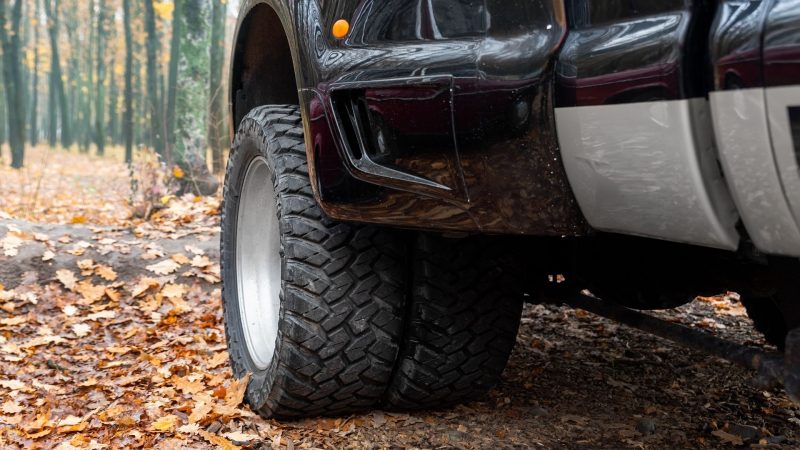The average weight of a fifth wheel is between 12,000 and 15,000 pounds. That means there are still fifth wheels over that 15,000-pound-mark and some that reach up to 20,000 pounds.
If you’re considering a fifth wheel for your travel needs, you also need to consider which truck will pull it. Your average half-ton truck won’t be able to tow that much weight safely.
Many one-ton trucks max out at 15,000-16,000 pounds. Maybe you need to consider a dually. Let’s take a closer look at this option.
What Is a Dually?
A dually truck has dual rear wheels on the rear axle and two wheels on the front axle. They can run off gas or diesel fuel and be two-wheel-drive or four-wheel-drive.
Most people who have a dually don’t own them for their smooth ride or sleek look. They ride pretty rough, especially when unloaded. Their main purpose is to tow and haul.
The dual rear wheels provide the stability that you don’t find in single-rear-wheel trucks. They do tend to be more expensive, especially the diesel engine dually trucks, but if you’re towing more than 15,000 pounds, it’s worth considering a dually.
Do You Need a Dually to Tow a Fifth Wheel?
You don’t need a dually to tow a fifth wheel. Remember, the average weight of a fifth wheel is between 12,000 and 15,000 pounds. Although there are heavier models, there are also lighter models.
For example, a Forest River Rockwood Ultra Lite 2442BS has a GVWR of fewer than 10,000 pounds, making it towable by a single-rear-wheel F-250 or Ram 2500 with no problem. It all depends on the size and weight of the RV.

What Kind of Truck Do You Need to Pull a Fifth Wheel?
The GVWR of the fifth wheel will help you decide what kind of truck you need. The GVWR is the maximum amount of weight the RV can hold.
You don’t want to exceed this weight. If you do, you may put too much strain on your truck. You could also put too much strain on the frame of the RV. So pay attention to the GVWR.
Another number you want to pay attention to is the hitch weight. The hitch weight of the Forest River Rockwood Ultra Lite 2442BS is about 1,250 pounds. So the amount of weight you put in the bed of your truck will be 1,250 pounds.
This means your truck needs to have a payload capacity over that amount. Payload is the amount of weight on or in the truck. When you think about payload, you have to account for the passengers, the stuff inside the truck (food, toys, books, tools, etc.), the weight of the fifth wheel hitch, and finally, the hitch weight of the fifth wheel.
Sometimes the payload capacity is why RV owners choose dually trucks over single-rear-wheel trucks. They have more weight they can safely haul in the bed of the truck. And a fifth wheel will be more stable in a dually truck because of the added wheels.
How Much Towing Capacity Do You Need for a Fifth Wheel?
This is completely dependent upon the fifth wheel you choose. As mentioned before, the Forest River Rockwood Ultra Lite 2442BS is less than 10,000 pounds.
But the Heartland Bighorn BH 3950 FL has a GVWR of 16,500 pounds and a hitch weight of more than 3,600 pounds. Your truck choices will be a much shorter list because of the amount of towing capacity and payload capacity you need.

At What Weight Do You Need a Dually?
Many RVers will say when you reach the 15,000-pound mark, you want to consider a dually truck. This doesn’t mean you can’t choose a single-rear truck and still travel safely. It just means the ride will be smoother with dual rear wheels.
If the payload exceeds 3,000 pounds, you probably want to consider a dually truck, also. When a fifth wheel hitch weighs about 3,000 pounds, it doesn’t leave much room for cargo and passengers in a single-rear-wheel truck.
In windy conditions or thunderstorms, RVs can sway on the interstate. Having an extra set of rear wheels helps maintain stability in those driving environments. When towing something exceeding 15,000 pounds or with a hitch weight of more than 3,000 pounds, you want a truck that will keep your fifth wheel on the road and in the correct lane.
You also want to feel comfortable as the driver. White-knuckle driving through those conditions isn’t enjoyable. Many RVers feel safer and more confident when driving a dually truck.
Are Duallys Safer?
Dually trucks are safer when considering the stability of the vehicle. The extra set of rear wheels provides better traction and balance when traveling down the road, especially at higher speeds.
But dually trucks also provide added safety in the event of a tire blow-out. Even when properly monitoring your tires, a tire blow-out is always possible.
Having an extra set of rear wheels can protect your vehicle from further damage. Then you can pull off to the side of the road to safely change the tire.

Is Getting a Dually for Your Fifth Wheel Worth It?
If you plan on purchasing a heavier fifth wheel, getting a dually truck is worth considering. If you find one with a diesel engine, you also have a greater chance of a longer lifespan for your truck.
Trucks with diesel engines can run for more than 300,000 miles sometimes. They’re more expensive to maintain and repair, but they also offer tremendous benefits if you’re towing a heavy load.
Consider the pros and cons. If you plan on towing a large fifth wheel, the stability, control, towing and payload capacities, and peace of mind that dually trucks offer outweigh the cons of expense and a rougher ride.
So does a dually truck fit your travel needs?
If You Want the Latest Travel News, Join Our Mailing List
Don’t rely on biased RV industry news sources to keep you informed. Stick with Nomadic News. We publish articles and breaking stories that matter to you every weekday.










